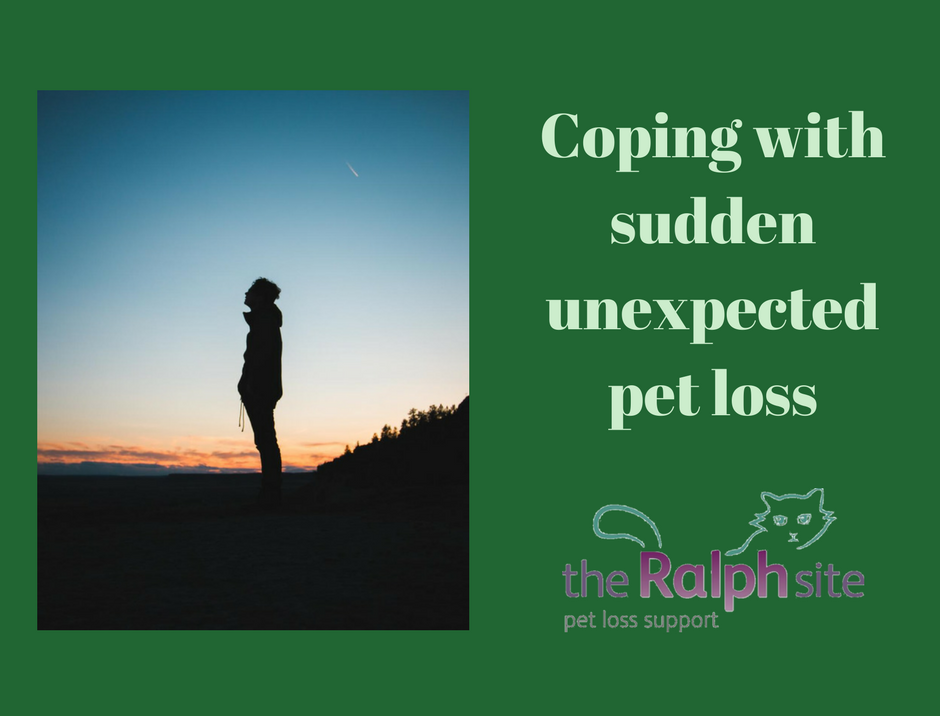|
Coping with sudden and unexpected pet lossAlthough all pet loss is traumatic, it can be especially hard to cope with when the death of your pet is sudden and unexpected. Tragic accidents such as being hit by a car or attacked by another animal, or a fatal stroke or seizure out of the blue can be almost impossible to accept.
People often talk about grief as a time for finding closure but, when a death is sudden and has occurred in traumatic circumstances, it can be very hard to find peace.
If you have recently lost a pet and it was unexpected, you may feel that life is very unfair. There’s a sense that your companion’s life was unjustly cut short – a life half-lived – with all of that wonderful potential extinguished in a moment.
These are natural, completely understandable feelings.
Symptoms of shockSudden and unexpected pet loss can cause pet carers to exhibit physical and emotional symptoms of shock. If your bereavement has just happened – or you’re reading this on behalf of someone it’s just happened to – you may find yourself shaking, experiencing palpitations, headaches, stomach aches, sleeplessness and more.
Some people even show signs of post-traumatic stress disorder (PTSD), which is defined as ‘recurring memories and a heightened state of arousal that lingers for more than a month after a traumatic event’. You don’t even have to have witnessed your pet’s passing to feel traumatised. Sometimes not having been there can be just as painful.
Even without symptoms of shock, you may find that you’re experiencing repetitive thoughts, a loss of appetite, guilt, anger, sadness, and that it might be hard to function at the moment.
Again, these feelings are to be expected.
 Making sense where there is noneAs we discussed in a previous article about pet loss guilt, [Link to http://theralphsiteshop.com/coping-with-pet-loss-guilt/] repetitive thoughts and blaming yourself or others for your pet’s passing are usually a way of making sense of what has happened.
In the case of a sudden and traumatic death, you may feel that you could have done more to stop it happening. It is also devastating to not have a chance to say goodbye.
If you are struggling with these feelings, there are few exercises you can try that you may find helpful.
1. Break down the eventSadly, accidents and unexpected illnesses can happen. Animals – just like humans – can die long before their time. Guilt and blame are about trying to understand what has happened and why.
If you’re stuck in a cycle of repetitive thoughts, try breaking down the event that lead to your pet’s passing. The aim is to see your role in the event within a larger context.
For example, if your cat ran into the path of a car because a sound frightened it, ask yourself:
In most cases, the answers to these questions will be ‘no’. If you had the power to change what happened, you would have done.
Please remember that you did not wish harm on your pet – you loved them and they had a beautiful life with you.
2. Think about quality of lifeRight now, you may be telling yourself that you shouldn’t have let your cat out or taken your dog for a walk or put your rabbit in their outdoor run (whatever the circumstances around your pet’s death).
However, it’s important to think about your motivation. You did these things to enhance your pet’s quality of life.
The only way to completely protect a pet from external harm is to keep it shut in a padded room away from all danger. But would that give any quality of life?
And what about the internal harms that we can’t control such as heart disease, cancers or epilepsy? Nothing can protect a pet from these hidden dangers.
It helps to remember that animals live in the moment - they don’t measure time the way we humans do and they don’t worry about the future or their mortality. During the life your precious pet lived, they were loved and happy. Maybe it isn’t the quantity of a life that really matters but the quality of the life
3. Honour your pet’s lifeAs we mentioned above, one of the worst parts about losing a pet unexpectedly is the feeling of a life unfinished. You have probably always imagined your pet growing old with you and years of companionship together.
One exercise that can help with these feelings is to write a letter to your pet, telling them about the life you had hoped for them. You could also write about the special memories you shared and the big impact they made on your life, even if you only had a short time together.
Some people find it helpful to talk to their lost pet or to memorialise them in some way. You could create a photo book of their life or a special site to visit and remember them.
Hopefully, you have supportive friends and family around you who will be happy to hear about your pet’s life rather than focusing on the events that led to their death. If you do need extra support, there are some excellent pet bereavement services.
Many people on The Ralph Site’s Facebook page and in the private Facebook group have experienced a traumatic loss too and can offer a sympathetic ear.
The main thing is to celebrate the life your pet lived and their unique personality. Instead of letting their story be about ‘the animal that died a tragic death’, tell the story of the animal that loved their belly tickled or had a favourite toy or who made people laugh with their funny quirks.
|
